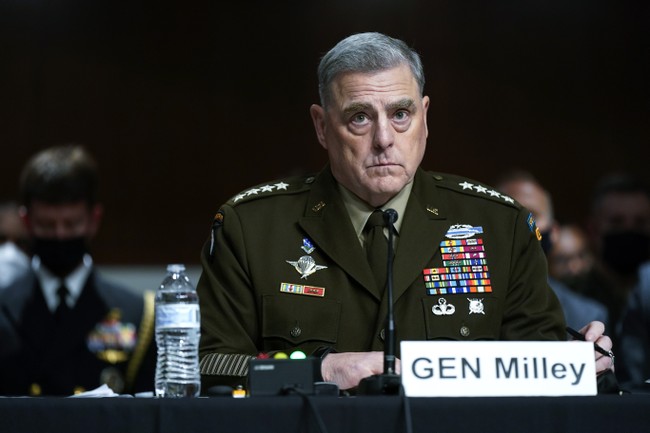The chairman of the House Committee on Oversight and Accountability’s Subcommittee on Government Operations and the Federal Workforce sent a preservation letter Thursday to Rosa Brooks, an associate dean at Georgetown University School of Law, for materials related to the Transition Integrity Project.
"I am seeking to gain a comprehensive understanding of your 2020 war-gaming project, its work, and its conclusions," said Rep. Pete Sessions.
The TIP was a Soros-funded effort created to wargame 2020 presidential election scenarios with people roleplaying President Donald J. Trump, Chief Justice John Roberts, and other officials to figure out the best ways to counter a Trump victory, a Biden victory that Trump would not accept or a disputed election result.
Session wrote that he was concerned that Georgetown was becoming a political actor in violation of rules governing its tax-free status.
I am particularly concerned by the activities of TIP, and any similar endeavor in advance of the 2024 election, because this exercise seems to have been administered adjacent to the Georgetown University Law School. As you know, Georgetown University operates as a 501(c)(3) nonprofit organization and receives hundreds of millions of dollars in federal funding every year. It would be highly inappropriate for a university that relies on federal funding to conduct partisan political activity intended to undermine a lawfully conducted election.
TIP ran its exercises in the spring and summer of 2020, and one of its concerns was the loyalty of the District of Columbia National Guard. The D.C. National Guardsmen responded effectively to the George Floyd riots in the nation's capital with a discipline that concerned TIP participants—so much so that in the final TIP report, the authors expressed concerns that they were too loyal to Trump.
Sessions also requested the names of all TIP participants—and critically, all participants with active U.S. government security clearances, passes for federal buildings, or connections to institutions, programs, and individuals who have received or anticipate federal funding, contracts, grants, and fees.
The congressman also wants the names of TIP participants who are members of the federal bar or professors who teach students at federal expense.
Read a more detailed account of the Transition Integrity Project here: “Tales of the McCabe: Who Are the Military Personnel Working Against Trump?”
During the Jan. 6, 2021, Capitol Hill protests, Pentagon generals and civilian leaders delayed the National Guard's mobilization to the Capitol for more than two hours, citing their concerns over the optics of the military restoring order. Leaders could also have been concerned that the Guardsmen would influence the presidential election's certification in favor of the Trump team's effort to challenge the elector slate committed to former Vice President Joseph R. Biden Jr.
J6 whistleblower Col. Earl G. Matthews, the senior legal advisor to the DCNG’s commanding general, told RedState the delay was so significant that New Jersey state troopers arrived at Capitol Hill before the D.C. National Guard.
Brooks, the daughter of the late Democratic Socialist Barbara Ehrenreich and clinical psychologist John Ehrenreich, defended a Palestinian missile landing at a Gaza hospital on social media.
The associate dean for Centers and Institutions has had a long-standing interaction with the military. She is an adjunct scholar at West Point's Modern War Institute and served as an attorney in the office Under Secretary of Defense for Policy Michèle Flournoy from 2009 to 2011. Flournoy led President Barack Obama's Pentagon transition team—and remarkably, the choice of retired Marine Gen. James Mattis to serve as his deputy when he took over the Pentagon for Trump.
Mattis succumbed to opposition from Trump staffers and dropped Flournoy, but the episode offers insight into Mattis and Brooks since she was the senior legal staffer to as significant an individual as Flournoy.
Given Brooks's involvement in TIP and her ties to the military, it would be natural to assume that she was involved in the TIP revival reported by Matthew Taibbi in his piece “Is the Fix Already In?”
Five days after Taibbi’s piece ran, Brooks told him she was not involved in the politics this cycle.
If Brooks is on the sidelines, why did Sessions send the letter to her?
Mary B. McCord
Sessions specifically singled out Professor Mary B. McCord for Brooks’ attention. McCord is now the executive director of the Georgetown University School of Law’s Institute for Constitutional Advocacy and Protections, or ICAP.
Just as Brooks is no utility player, neither is McCord.
Before McCord joined Brooks’ team at Georgetown, she was a holdover from President Barack Obama, serving in the early months of the Trump administration.
As the acting assistant attorney general for the National Security Division, McCord worked with another Obama holdover, acting Attorney General Sally Q. Yates, worked together to kneecap National Security Advisor Michael T. Flynn.
The subcommittee chairman quoted McCord in the letter from an interview she gave to NBC News, in its Jan. 14 web article, “Fears grow that Trump will use the military in ‘dictatorial ways’ if he returns to the White House.”
McCord told NBC: “We’re already starting to put together a team to think through the most damaging types of things that he [Trump] might do so that we’re ready to bring lawsuits if we have to.”
The congressman then made a request:
Please define if Professor McCord and her colleagues are conducting this hyperpartisan activity under the auspices of ICAP—an entity which is described as a ‘non-partisan institute within Georgetown University Law Center.
In another section of the letter, Sessions asked if Brooks and Georgetown were involved in what NBC News described as a loose-knit network of public interest groups and lawmakers devising plans to suppress the Article Two provisions defining presidential control of the military.
Sessions wrote that NBC News also suggested that McCord would be running the effort to undermine civilian control of the Pentagon.
Continued civilian control of the Pentagon is being challenged by the idea that the military is an autonomous or even feudal fiefdom immune from political influence—political meaning democratic.
The highest-profile proponent of Pentagon autonomy is retired Gen. Mark A. Milley. In speeches and interviews, Milley repeated the phrase: "We took an oath to the Constitution, not an individual.”

Sometimes, Milley gussies up the line referring to kings and dictators, but the reasoning is the same: The Pentagon does not answer to the president but to the Constitution, which the Pentagon is free to interpret for itself.
In Federalist 69, Alexander Hamilton wrote that the president, like the King of Great Britain, would have the supreme command and direction of the military and naval forces, as the first general and admiral of the country.
Milley said it was up to him to figure it out. Hamilton said the senior general and admiral is the president.
McCord’s effort to suppress Article Two refers to the Constitution’s Article Two, Section 2:
The President shall be Commander in Chief of the Army and Navy of the United States, and of the Militia of the several States, when called into the actual Service of the United States…
If NBC News is correct, McCord is going to fight her battle in the courts, and that is where her husband comes in.
Sheldon ‘Shelly’ Snook
Attorney Sheldon “Shelly” Snook took a different path than his wife, Mary McCord. In 2014, when his wife was climbing the Justice Department ladder as a prosecutor with the District of Columbia’s U.S. Attorney’s office, Sheldon left his job as a senior administrative assistant to judges at the district’s federal courthouse and spokesman for the district's Foreign Intelligence Surveillance Court, for a job at the Supreme Court.
Snook became a senior staffer to Chief Justice John G. Roberts, a position he held until 2020. In 2020, he joined the National Constitution Center’s “Battle for the Constitution,” which partnered with Atlantic magazine and was endowed by the Madison Initiative of the leftwing William and Flora Hewlett Foundation.
Another project Snook is working on is shutting down the longtime practice, most recently used by conservative litigants, of filing petitions in single-judge federal courthouses.
One example is the Amarillo, Texas, federal courthouse, where Judge Matthew J. Kacsmaryk handles more than 95 percent of the cases, where Texas Attorney General Kenneth Paxton filed many of his lawsuits against the Biden administration.
Or, at the very least, for cases of national significance, assign the cases randomly among the judges of the district. https://t.co/goL6YEkist
— Sheldon Snook (@SheldonSnook) April 11, 2023
In early March, Snook's old boss, Roberts, tried to end so-called judge shopping with a new rule he ushered through the Committee on Court Administration and Case Management of the Judicial Conference of the United States.
The new rule would have made judge selection a lottery with larger pools of judges, with the possibility of video conference proceedings to ease travel between far-flung courthouses.
Soon after Roberts announced the new rule, the Supreme Court issued a statement clarifying that it was a recommendation. Besides the blowback from conservative litigants and solo judges, the rule would usurp the authority of a district's chief justice, who, by statute, supervises the selection of judges for cases.
That battle is still on, and it will become essential if there is litigation concerning election challenges—or maybe a case challenging the president’s authority over the military.














Join the conversation as a VIP Member